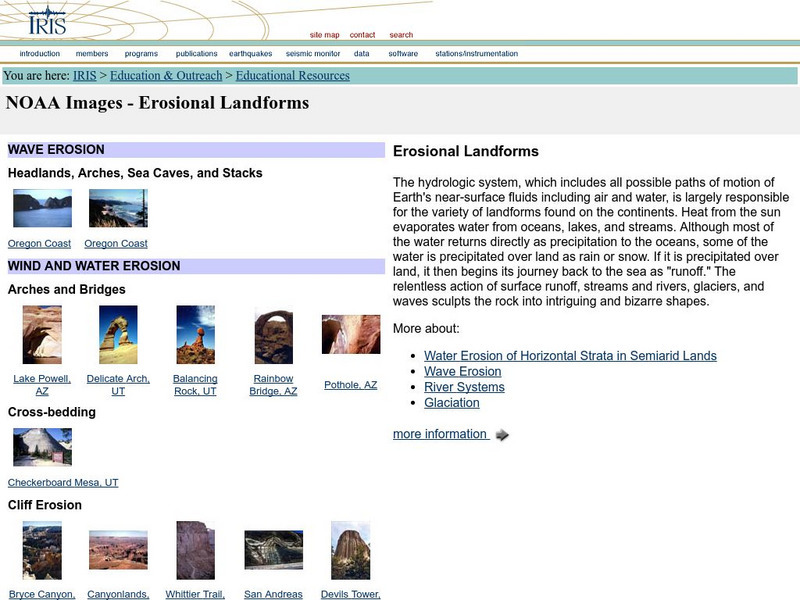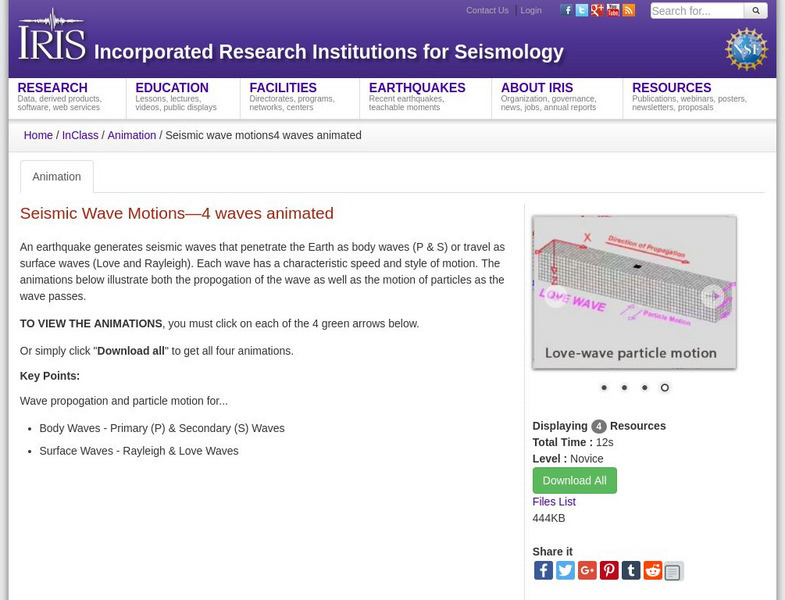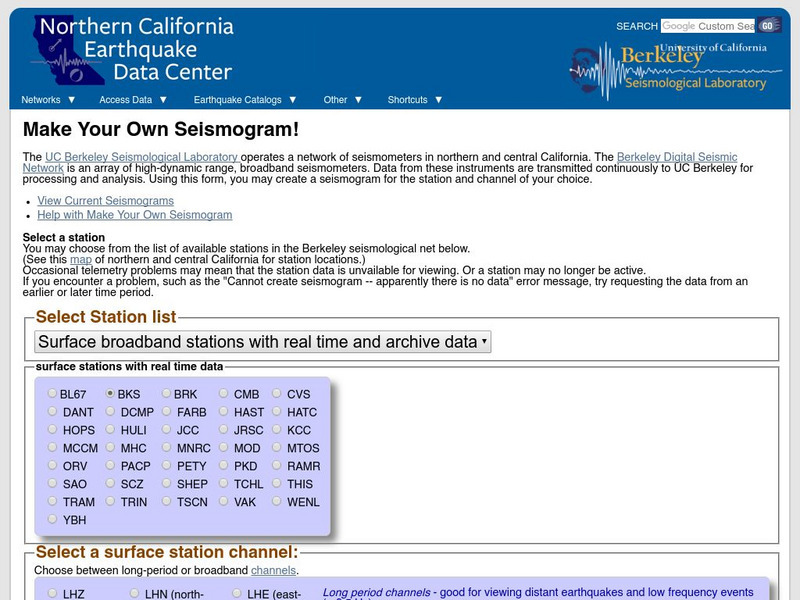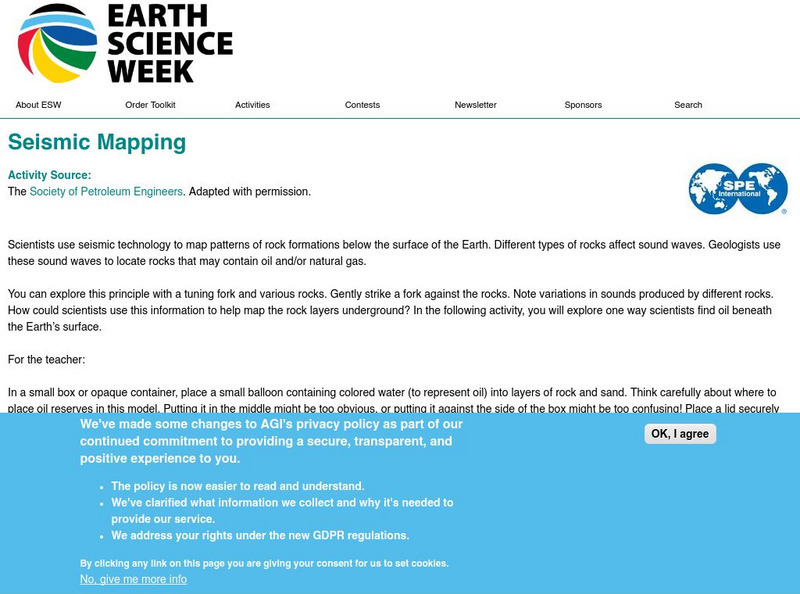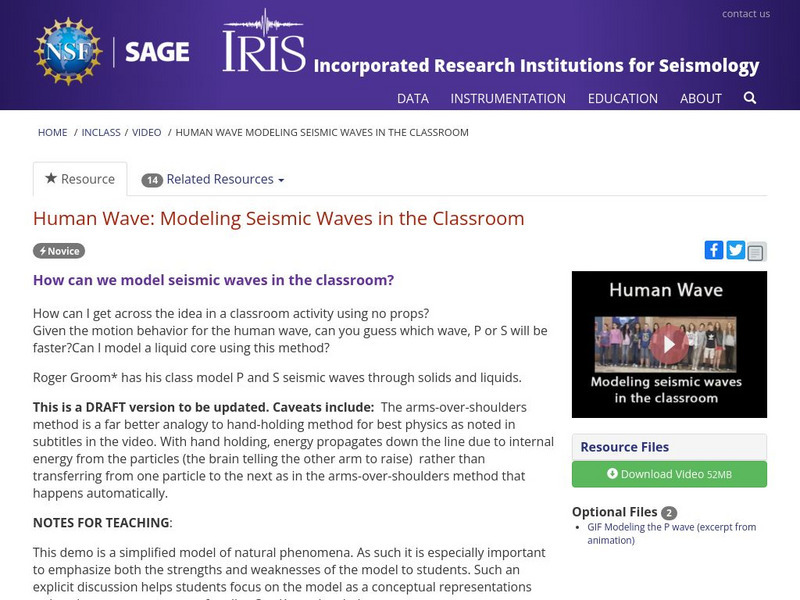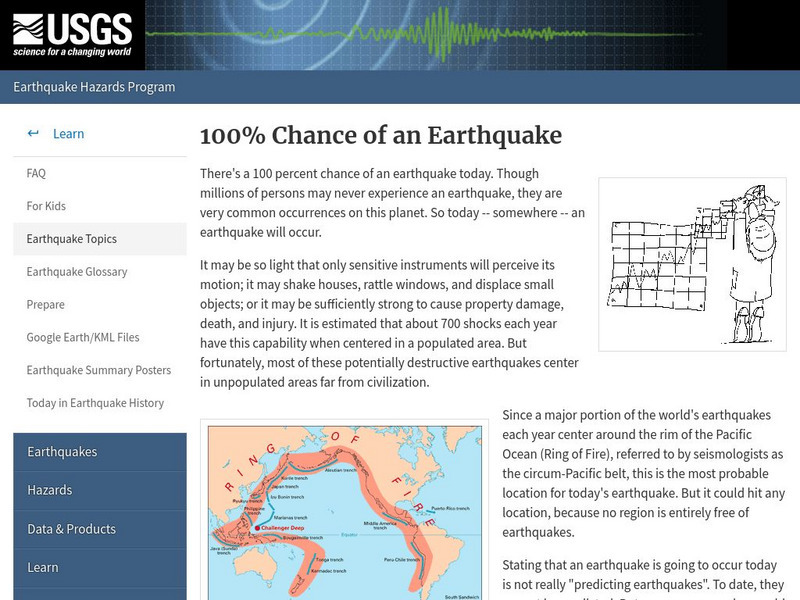University of Washington
Iris: Noaa Images: Erosional Landforms
Examples, with images, of different types of landforms created by water and wind erosion.
American Geosciences Institute
American Geosciences Institute: Earth Science Week: Seismic Calendar
Students investigate how often earthquakes of various magnitudes happen within specific geographic regions.
Incorporated Research Institutions for Seismology
Iris: Seismic Wave Motions
Four animations showing the movements of surface waves and body waves that are created by earthquakes. Includes P, S, Rayleigh, and Love waves.
Curated OER
Michigan Technological Univ.: Seismology & Seismic Waves
Definitions and descriptions of a variety of seismic waves such as s, p, Love, and Rayleigh waves, diagrams, and speeds.
Curated OER
Michigan Technological Univ.: Seismology & Seismic Waves
Definitions and descriptions of a variety of seismic waves such as s, p, Love, and Rayleigh waves, diagrams, and speeds.
Michigan Technological University
How Are Earthquake Magnitudes Measured?
This website explains how the Richter and Mercalli Scales work.
Stephen Byrne
History for Kids: Ancient Chinese Science
History for Kids overview on the science and innovations of ancient China. Students learn about the significant impact China made on the world with contributions in the fields of astronomy, chemistry, physics, meteorology and seismology.
California Institute of Technology
Cal Tech: The Great 1857 Fort Tejon Earthquake
Basic information about the 1857 "Fort Tejon" Earthquake, along with comparison to other quakes, location of the epicenter, and faults involved.
PBS
Pbs Teachers: Seismometer
Build an instrument for measuring movement to learn about how scientists measure the Earth's movement with a seismometer.
Other
Ncedc: Make Your Own Seismogram
This site from NCEDC gives you an opportunity to "make your own seismogram" by choosing from a number of options on the screen.
US Geological Survey
Usgs: November 29, 1975 Kalapana
Describes details of the earthquake of November 29, 1975 Kalapana in Hawaii, the tsunami, and the eruption of the volcano Kilauea as a result of the earthquake.
American Geosciences Institute
American Geosciences Institute: Earth Science Week: Seismic Mapping
Students become scientists, and learn about the usef of seismic technology to map patterns of rock formations below the surface of the Earth.
Space.com
Space.com: Cracking the Code of Pre Earthquake Signals
Earthquakes can often hit unexpectedly. This article reveals some of the intricacies of these natural disasters and what signs serve as indicators to alert seismologists.
Michigan Technological University
Michigan Tech University: Where Do Earthquakes Happen?
An informative site that explains how and where earthquakes occur and the different types of faults. Contains maps and charts of fault lines, plate edges, and the continental plates. There are other links within the site of related...
Exploratorium
Exploratorium: The Faultline/seismic Slinky
A lesson plan for investigating longitudinal waves by use of a Slinky toy. Directions, questions, and applications to seismic waves are provided.
Incorporated Research Institutions for Seismology
Iris: Human Wave: Modeling Seismic Waves in the Classroom
A demo of how can we model seismic waves in the classroom. [8:27]
CK-12 Foundation
Ck 12: Earth Science: Scales That Represent Earthquake Magnitude Study Guide
[Free Registration/Login may be required to access all resource tools.] Provides a summary of methods used to measure earthquakes. Includes some questions to check for understanding.
US Geological Survey
U.s. Geological Survey: 100 Percent Chance of an Earthquake
Did you know there is an earthquake somewhere on Earth every day? Read about this very common Earth event.
University at Buffalo
University at Buffalo: Mceer: Earthquake Engineering to Extreme Events
Information from the Multidisciplinary Center for Earthquake Engineering Research guided toward enhancing the ability of communities to survive and rebuild after an earthquake. Includes current news and conferences, and information about...
CK-12 Foundation
Ck 12: Earth Science: Seismic Waves Study Guide
[Free Registration/Login may be required to access all resource tools.] This study guide summarizes key points about types of seismic waves. Includes a few questions to check for understanding.
Other
Matter Project: Seismic Waves
Seismic waves are studied to better understand the ground beneath us, the layers of Earth and points of interest for earthquakes. Better understand the types of waves, what substances they may travel through and how, and gain a clearer...
Other popular searches
- Seismology Timeline
- Seismology Time Line
- Time Line of Seismology
- Timeline of Seismology
- Seismology Earth Layers
- Onshore Seismology
- Seismology Plate Tectonics
- Offshore Seismology
- Development of Seismology
